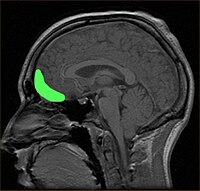
Photo from wikipedia
BACKGROUND Buying-shopping disorder (BSD) is a severe mental disorder in which individuals lose control over their buying/shopping behavior. It is debated whether BSD shares characteristics with other behavioral addictions. The… Click to show full abstract
BACKGROUND Buying-shopping disorder (BSD) is a severe mental disorder in which individuals lose control over their buying/shopping behavior. It is debated whether BSD shares characteristics with other behavioral addictions. The current study aimed at investigating addiction-related concepts, i.e. cue-reactivity/craving, implicit cognitions, and inhibitory control mechanisms, in the context of BSD. METHODS An analog sample of 277 participants completed a cue-reactivity paradigm with shopping-related pictures. To assess implicit cognitions (attentional bias and implicit associations) and inhibitory control, a visual dot probe paradigm, an implicit association test, and an affective shifting task, all with shopping-related and control pictures, were administered. The sequence of the three tasks was randomized across participants. Craving was measured prior and after the cue-reactivity paradigm and after completion of the experimental procedure. BSD severity was assessed using the Pathological Buying Screener (PBS). RESULTS Increases in craving during the cue-reactivity paradigm, but decreases after the experimental procedure were observed. Craving, attentional bias and implicit cognitions were related to BSD severity-but not to inhibitory control. However, we found moderating effects of attentional bias and inhibitory control as well as implicit associations and inhibitory control on the relationship between craving and BSD severity. DISCUSSION/CONCLUSION Results emphasize the role of cue-reactivity/craving, implicit cognitions and inhibitory control in the context of BSD. In line with models for behavioral addictions (I-PACE; Brand et al., 2019), the interaction of affective and cognitive biases towards shopping cues and dysfunctional inhibitory control mechanisms seems to explain the pathological engagement in buying/shopping despite negative consequences.
Journal Title: Addictive behaviors
Year Published: 2020
Link to full text (if available)
Share on Social Media: Sign Up to like & get
recommendations!